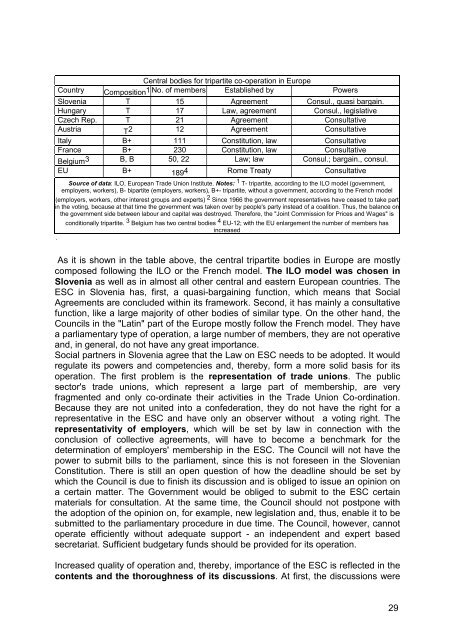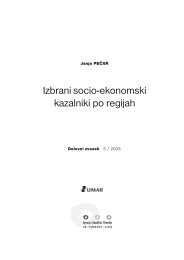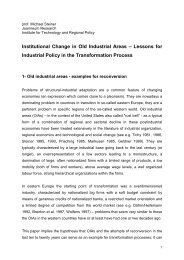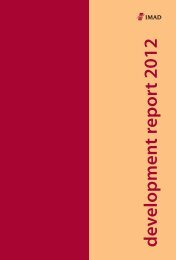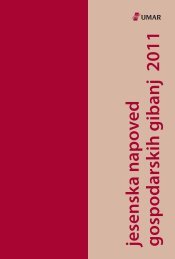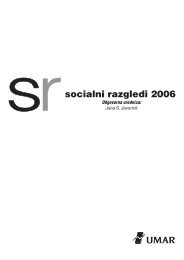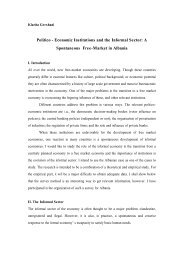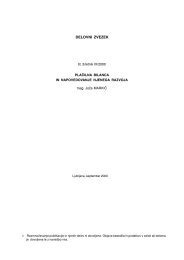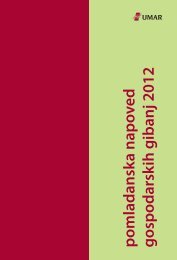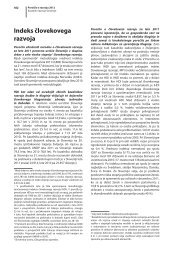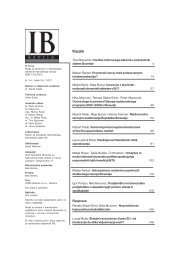The Development of New Industrial Relations in Slovenia - UMAR
The Development of New Industrial Relations in Slovenia - UMAR
The Development of New Industrial Relations in Slovenia - UMAR
You also want an ePaper? Increase the reach of your titles
YUMPU automatically turns print PDFs into web optimized ePapers that Google loves.
Central bodies for tripartite co-operation <strong>in</strong> Europe<br />
Country Composition1 No. <strong>of</strong> members Established by Powers<br />
<strong>Slovenia</strong> T 15 Agreement Consul., quasi barga<strong>in</strong>.<br />
Hungary T 17 Law, agreement Consul., legislative<br />
Czech Rep. T 21 Agreement Consultative<br />
Austria T2 12 Agreement Consultative<br />
Italy B+ 111 Constitution, law Consultative<br />
France B+ 230 Constitution, law Consultative<br />
Belgium3 B, B 50, 22 Law; law Consul.; barga<strong>in</strong>., consul.<br />
EU B+ 1894 Rome Treaty Consultative<br />
Source <strong>of</strong> data: ILO, European Trade Union Institute. Notes: 1 T- tripartite, accord<strong>in</strong>g to the ILO model (government,<br />
employers, workers), B- bipartite (employers, workers), B+- tripartite, without a government, accord<strong>in</strong>g to the French model<br />
(employers, workers, other <strong>in</strong>terest groups and experts) 2 S<strong>in</strong>ce 1966 the government representatives have ceased to take part<br />
<strong>in</strong> the vot<strong>in</strong>g, because at that time the government was taken over by people's party <strong>in</strong>stead <strong>of</strong> a coalition. Thus, the balance on<br />
the government side between labour and capital was destroyed. <strong>The</strong>refore, the "Jo<strong>in</strong>t Commission for Prices and Wages" is<br />
conditionally tripartite. 3 Belgium has two central bodies 4 EU-12; with the EU enlargement the number <strong>of</strong> members has<br />
<strong>in</strong>creased<br />
.<br />
As it is shown <strong>in</strong> the table above, the central tripartite bodies <strong>in</strong> Europe are mostly<br />
composed follow<strong>in</strong>g the ILO or the French model. <strong>The</strong> ILO model was chosen <strong>in</strong><br />
<strong>Slovenia</strong> as well as <strong>in</strong> almost all other central and eastern European countries. <strong>The</strong><br />
ESC <strong>in</strong> <strong>Slovenia</strong> has, first, a quasi-barga<strong>in</strong><strong>in</strong>g function, which means that Social<br />
Agreements are concluded with<strong>in</strong> its framework. Second, it has ma<strong>in</strong>ly a consultative<br />
function, like a large majority <strong>of</strong> other bodies <strong>of</strong> similar type. On the other hand, the<br />
Councils <strong>in</strong> the "Lat<strong>in</strong>" part <strong>of</strong> the Europe mostly follow the French model. <strong>The</strong>y have<br />
a parliamentary type <strong>of</strong> operation, a large number <strong>of</strong> members, they are not operative<br />
and, <strong>in</strong> general, do not have any great importance.<br />
Social partners <strong>in</strong> <strong>Slovenia</strong> agree that the Law on ESC needs to be adopted. It would<br />
regulate its powers and competencies and, thereby, form a more solid basis for its<br />
operation. <strong>The</strong> first problem is the representation <strong>of</strong> trade unions. <strong>The</strong> public<br />
sector's trade unions, which represent a large part <strong>of</strong> membership, are very<br />
fragmented and only co-ord<strong>in</strong>ate their activities <strong>in</strong> the Trade Union Co-ord<strong>in</strong>ation.<br />
Because they are not united <strong>in</strong>to a confederation, they do not have the right for a<br />
representative <strong>in</strong> the ESC and have only an observer without a vot<strong>in</strong>g right. <strong>The</strong><br />
representativity <strong>of</strong> employers, which will be set by law <strong>in</strong> connection with the<br />
conclusion <strong>of</strong> collective agreements, will have to become a benchmark for the<br />
determ<strong>in</strong>ation <strong>of</strong> employers' membership <strong>in</strong> the ESC. <strong>The</strong> Council will not have the<br />
power to submit bills to the parliament, s<strong>in</strong>ce this is not foreseen <strong>in</strong> the <strong>Slovenia</strong>n<br />
Constitution. <strong>The</strong>re is still an open question <strong>of</strong> how the deadl<strong>in</strong>e should be set by<br />
which the Council is due to f<strong>in</strong>ish its discussion and is obliged to issue an op<strong>in</strong>ion on<br />
a certa<strong>in</strong> matter. <strong>The</strong> Government would be obliged to submit to the ESC certa<strong>in</strong><br />
materials for consultation. At the same time, the Council should not postpone with<br />
the adoption <strong>of</strong> the op<strong>in</strong>ion on, for example, new legislation and, thus, enable it to be<br />
submitted to the parliamentary procedure <strong>in</strong> due time. <strong>The</strong> Council, however, cannot<br />
operate efficiently without adequate support - an <strong>in</strong>dependent and expert based<br />
secretariat. Sufficient budgetary funds should be provided for its operation.<br />
Increased quality <strong>of</strong> operation and, thereby, importance <strong>of</strong> the ESC is reflected <strong>in</strong> the<br />
contents and the thoroughness <strong>of</strong> its discussions. At first, the discussions were<br />
29


